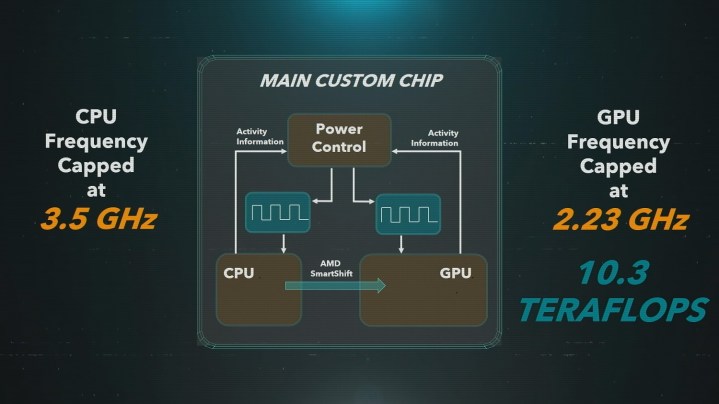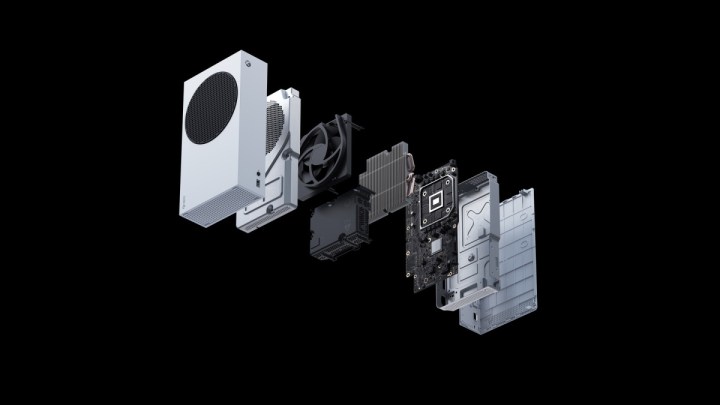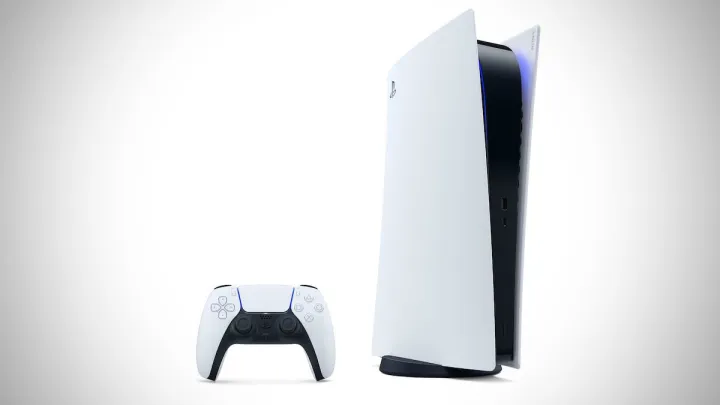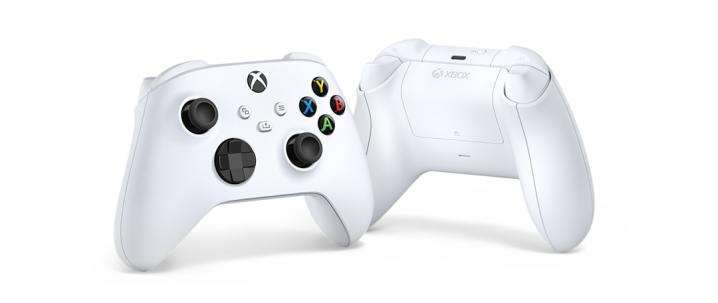Between the regular PlayStation 5, PS5 Pro, Xbox Series X, and Xbox Series S, buying a current-gen console is not as simple as it once was. However, you do need to make the right choice if you want to play the best PS5 games or best Xbox Series games, which is the most important factor in a gaming machine. Sure, many games are now cross-platform, but not all of them. We compared the PS5 to the Xbox Series X already, but what about the S? Let’s pit Sony’s console against the smaller Xbox and see which one is worth it for you.
PlayStation 5 vs. Xbox Series S: specs
Right off the bat, we need to point out that the PS5 and Xbox Series S are aimed toward slightly different audiences, and their specs do differ a considerable amount. The PS5 is aimed toward a “premium” audience looking for high-end visuals and performance, while the Series S is presented as more of an affordable option to get as many players on board as possible. You’ll notice the PS5 is a more powerful system in many ways than the Series S, but that doesn’t necessarily mean deciding between the two is easy. When it comes to specs, both offer custom SSDs (solid-state drives), meaning games and apps will load incredibly fast. This is a huge upgrade from the current generation’s HDDs (hard disk drives), which are starting to show their age as games become much larger in scope.
The main difference between the two on the surface is that the Series S lacks a disc drive, while the standard PS5 will accept 4K UHD Blu-Ray discs. This could be a major factor for some, especially those with less reliable internet connections. The standard PS5 will cost more than the Xbox Series S, and a lower price point could prove to be the most enticing factor when choosing one over the other.
Another main difference in specs is attributed to the PS5’s 10.3 TFLOPS, 36 CUs, and 16GB GDDR6 memory — compared to the Xbox Series S’s 4 TFLOPS, 20 CUs, and 10GB GDDR6 memory. We’ll get into the specifics of what that means later on, but the point is that you’re getting a less powerful, but more affordable machine if you buy a Series S. Microsoft has also noted that the Series S is the “smallest Xbox ever,” and while we don’t know the exact dimensions of it, you can guarantee it will be more compact than the PS5. This, again, might make a difference depending on the space you have at your disposal.
Here’s what to expect from each system, in terms of specs.
| PlayStation 5 | Xbox Series S | |
| Dimensions | – | – |
| Weight | 10.54 pounds | 4.25 pounds |
| Color | Black and White | White |
| CPU | 8-core, 3.5GHz Custom Zen 2 | 8-core, 3.6 GHz, AMD Zen 2 |
| GPU | 36 CUs, 10.3 TFLOPS, 2.23GHz | 20 CUs, 4 TFLOPS, 1.565GHz |
| Memory | 16GB GDDR6 | 10GB GDDR6 |
| Memory bandwidth | 448GB/s | 224GB/s |
| Storage | 825GB Custom SSD | 512GB NVME SSD |
| Optical drive | 4K UHD Blu-ray drive | No, digital only |
| 4K | Yes | 1440p, scalable 4K |
| HDR | – | – |
| Ports | Includes USB and NVME slot | USB |
| Online subscription | PS Plus | Xbox Live Gold |
| Price | $450/$500 | $299 |
| Availability | November 12, 2020 in the US (November 19 in other territories) | November 10, 2020 |
| Digital Trends review | PS5 Review | Series S Review |
PlayStation 5 vs. Xbox Series S: graphics

But what about visuals? This is yet another possible major factor for some when choosing between the two. Despite the noticeable difference in specs, either one will offer beautiful visuals — it just comes down to what you’re looking for in a console. But let’s compare each system’s teraflops (TFLOPS), as it’s a great place to start when evaluating the visual fidelity of the machines. You’ve probably seen or heard this term pop up recently as a buzzword throughout the marketing of each system. A TFLOP is a measurement of a computer or console’s performance, and it refers to the ability of a machine to calculate one trillion floating-point operations per second.
When comparing the two, the PS5 features 10.3 TFLOPS, over double that of the Series S’s 4 TFLOPS. This means the PS5 can calculate 10.3 trillion floating-point operations per second, compared to the Series S’s 4 trillion. This is partially why the PS5 will be able to output at a higher resolution than the Series S. In fact, the Series S has fewer TFLOPS than that of the PS4 Pro, which sits at around 4.2. Still, the Series S is way more powerful than its predecessor, the Xbox One — and intends for it to offer 1440p resolution at up to 120 frames per second, without the need for a 4K display.
The PS5 will feature 36 CUs and a GPU frequency capped at 2.23GHz — compared to Xbox Series S’s 20 CUs and 1.565GHz. In essence, these figures determine a machine’s clock speed, or the rate at which the system can perform internal operations. The PS5 will allow for a variable clock speed, based on what is required of the GPU. As for the Series S, it will deliver four times the processing power of the Xbox One, making it a worthy choice for a next-generation machine, especially at that price.
All in all, despite one being more powerful than the other, you might not “need” a system with 10.3 TFLOPS. Even with the less powerful Xbox Series S, it’s still a beast compared to what we have now, and it’s able to deliver faster load times and higher (and more steady) frame rates, all thanks to the Xbox Velocity Architecture.
PlayStation 5 vs. Xbox Series S: resolution

In terms of resolution, you’ll notice a difference between the two machines — particularly in that the PS5 supports 4K output at 120Hz, and is said to be future-proofed with 8K support as well. Since 8K won’t be the standard for several more years, that might not be a huge factor for you right now, but it is forward-thinking that Sony is opting to future-proof its machine with 8K support. The Xbox Series S, on the other hand, delivers great visuals at 1440p resolution and up to 120 frames per second, and can also scale your games up to 4K if you have a display that supports it. This means you can still get beautiful-looking games without the need for a 4K screen, though if you have one, games will look even better.
Both machines seem to offer support of “up to 120 frames per second,” though you’ll need a display that can render these fast frame rates. With each system, you’ll have a much better visual experience with less screen tearing if you’ve got a monitor that features 120Hz refresh rates — which the Xbox Series S and PS5 will support.
In yet another attempt to future-proof, both will feature an HDMI 2.1 port, and despite this not being the standard quite yet, the systems will be ready to go once HDMI 2.1 becomes more ubiquitous. HDMI 2.1 will allow for much lower latency, improved frame rates, and eventually, 8K support — just don’t expect to enjoy resolutions that high with the Series S.
Again, if high resolution is important to you, the PS5 should be your first choice in this regard, as the Series S is capped at 1440p (with scalable 4K).
PlayStation 5 vs. Xbox Series S: storage

Yet another important factor with each system is the amount of onboard memory they’ll come with, and the two differ in this regard. The Xbox Series S comes with a 512GB NVME SSD, while the PS5 will launch with an 825GB SSD. This might seem like a tremendously low amount on both fronts, and while it technically is, the power of the SSD will likely make up for it. With the PS5, its custom SSD features a raw read bandwidth of around 5.5GB per second, meaning it will be able to run more efficiently than a standard SSD off the shelf. In other words, it will run more efficiently and it will allow for the decompression of file sizes, due to the Oodle Kraken algorithm from RAD Game Tools.
This decompression of file sizes is key and will free up space and lower the amount of texture pop-in — allowing files to be read in milliseconds. This means that despite the seemingly low hard-drive size of the PS5, the files for games themselves should, in theory, be smaller, and you’ll get more mileage out of the SSD overall. This will, of course, be up to the developer, but we’ve got our fingers crossed that the days of 150GB+ install sizes will be over.
The PS5 plays most PS4 games. Takashi Mochizuki of Bloomberg uploaded a video of the PS5 running the PS4 version of Marvel’s Spider-Man, compared to the same game running on a PS4 Pro. The result was staggering, as the game was able to load on PS5 in less than a second, compared to eight seconds on a PS4 Pro. Now, bear in mind, this is a less technically demanding game than something you might see on PS5 natively, but it’s still a great way to measure the SSD’s speed. Check out the footage below:
Sony's official video comparing performance of PS4 Pro vs next-gen PlayStation pic.twitter.com/2eUROxKFLq
— Takashi Mochizuki (@6d6f636869) May 21, 2019
As for the Xbox Series S, it, too, will feature an SSD, though it is different than the one included with PS5. We do know the Series S’s hard drive will feature a read speed of 2.4GB per second, which is less than half of that of the PS5. Even at 2.4GB per second, this is still a massive leap compared to what we have with the current generation in which the Xbox One X only reads at 120MB per second.
And if you’re worried about storage space on your machines, both the PS5 and the Xbox Series S allow for external storage upgrades.
While we know how fast both SSDs will be based on sheer numbers, it’s not exactly clear how they will perform in practice, as it will ultimately depend on what you’re trying to run. As the technology improves, the size and scope of games likely will, too, so everything seems to be scaling upward. At the end of the day, the PS5 will come with a larger hard drive than the Xbox Series S, so keep that in mind when making your decision to purchase.
PlayStation 5 vs. Xbox Series S price

Price is likely the most important factor for consumers looking to purchase a next-generation machine. In fact, many potential buyers will not compare specs at all, and will purchase whichever system is less expensive. For this reason, Microsoft has prioritized low cost with the Xbox Series S, making it easy for consumers to jump into the next generation of games. The Series S is less powerful than the PS5, yes, but it will only cost $300. This is a massive win for Microsoft, especially compared to the price of both PS5s, which are more expensive than the Series S — but remember, you certainly get what you pay for.
Microsoft is offering the Series S as part of its All Access program, allowing you to pay a monthly amount to gain immediate access to the system and Game Pass Ultimate with no upfront cost — just like buying a new smartphone. With the Xbox Series S, specifically, it will cost you $25 (35 for the Xbox Series X) each month, and you’ll receive your console right away, along with two years of Game Pass Ultimate. This, again, is just a testament to Microsoft’s consumer-friendly approach.
When it comes to the PS5, the Digital Edition will be $450 and the Standard Edition will be $500, which is on par with what many were predicting. In terms of the power of the systems, you can get the best looking next-gen experiences for the least amount of money by getting the Digital Edition PS5. But many consumers might not take this into consideration and opt to go with the Series S, despite it being inferior from a technical standpoint.
PlayStation 5 vs. Xbox Series S: games

Aside from price, the other major factor that will sway consumers is the games available on each machine. Both will feature many of the same third-party titles like Cyberpunk 2077, Fortnite, and Baldur’s Gate 3.
When it comes to a first-party lineup of games, Sony has the edge. Microsoft has spent recent years acquiring more studios and focusing more on exclusive games, but it has moved away from making its games exclusive. There are too many excluives to name, but check out our list of the best PS5 exclusives and Xbox exclusives for the highlights.

It’s also worth touching upon the notion of backward compatibility — which both systems will include, though each platform handles differently. The Xbox Series S and Series X handle backward compatibility the same way as Xbox One. It all works through software, instead of “true” backward compatibility in the traditional sense. The solution Microsoft has come up with is consumer friendly, cost efficient, and works with a huge library of games from the original Xbox to current titles.
The PS5 is almost universally backward compatible with PS4 games and has a growing library of PS1, PSP, PS2, and PS3 games available via its PlayStation Plus subscription service. You cannot, however, use any discs from generations prior to PS4 on the console.
We do know a large selection of current-generation games will feature upgrades to the next-generation versions within the same family — some free and others that will cost a small fee. For example, games like The Witcher III, Cyberpunk 2077, Grand Theft Auto V, Rainbow Six Siege, and Control will all be upgradable, and the list continues to grow as we get closer to this holiday season. Do keep in mind that the Series S versions of these games will be presented at a lower resolution than the Series X counterparts — as well as the PS5 versions.
PlayStation 5 vs. Xbox Series S: controllers

Both the PS5 and Xbox Series S systems will come packaged with a controller, so let’s get into the differences of each. The Series S will feature the same controller that comes with the Series X, but it will be Robot White instead of black. This controller mirrors the Xbox One controller, but comes with some new enhancements for the upcoming generation. Microsoft boasts “improved ergonomics,” a new hybrid D-pad, better grip on the triggers, and the new Share button. It won’t be much of a departure from the already fantastic Xbox One controller, but will come packed with some new bells and whistles that make it better.
The PS5’s new controller, DualSense, is an even bigger departure from its predecessor for many reasons. Obviously, dropping the DualShock moniker is a major difference, but the controller itself is a fresh take as well. It features adaptive triggers that offer varying degrees of resistance based on how hard you pull them. The DualSense also features haptic feedback, and replaces its Share button with a new Create button instead. This new button will likely be coupled with enhanced software that focuses not just on sharing, but editing and creating videos and images.
The biggest change comes with the DualSense’s appearance — dropping the solid color found with most PS4 DualShocks. What you get is a mix of black, white, and blue, mirroring the PS5 system itself. Both are now available in a wide range of colors, plus in the Elite model for Xbox and DualSense Edge for PlayStation.




